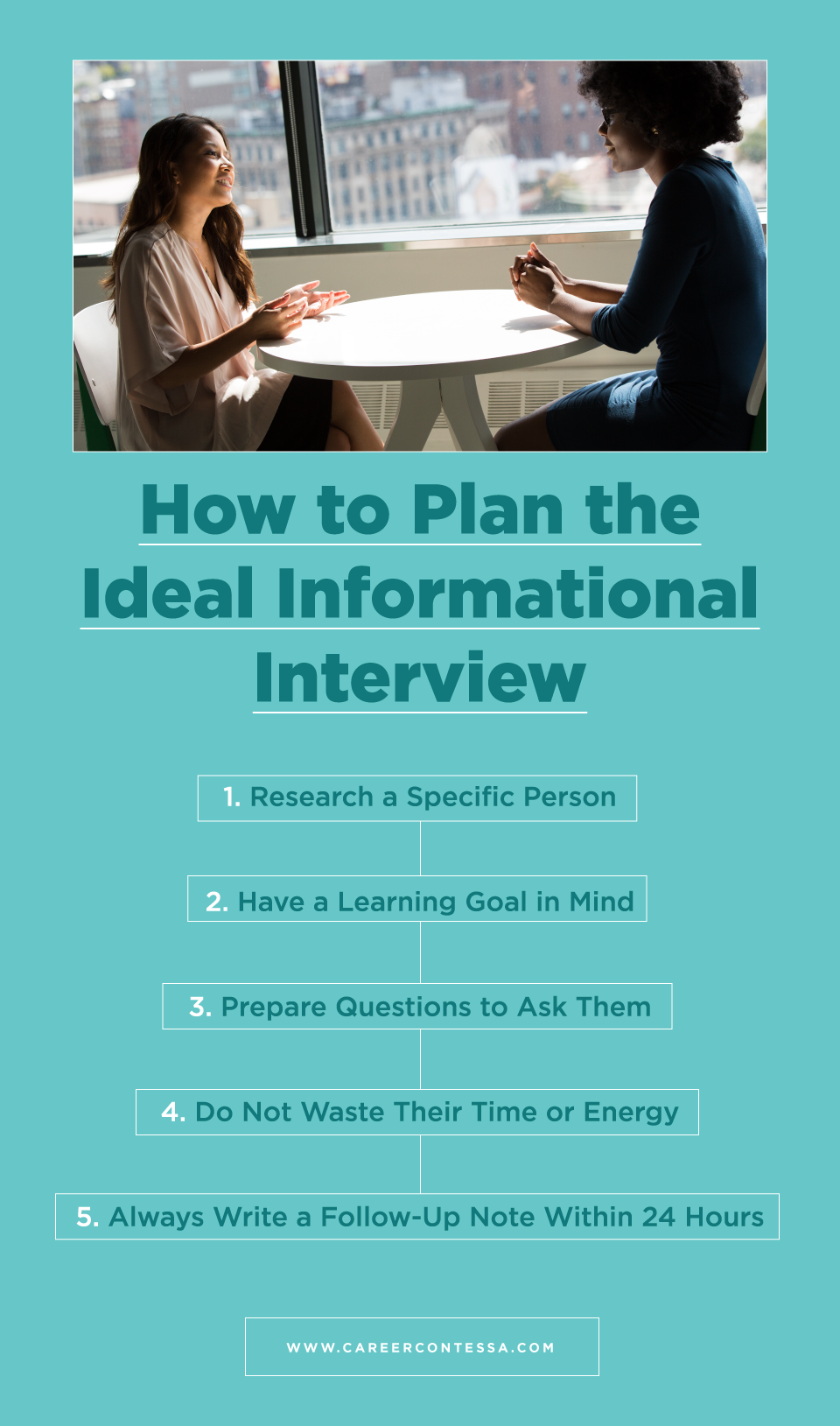We love
an informational interview around here because they're truly the best way to get a clear picture of companies (or jobs) that interest you.
It also happens to be how our founder, Lauren McGoodwin, found her career in recruiting.
Over a nine-month period, she reached out to 70 people about having informational interviews, and 30 of them got back to her. In the end, she found her dream position working for Hulu through one of those professional connections.
When we began to put this article together, we figured we might as well use our in-house expert. Without further ado, here’s Lauren’s 5-step guide to running a perfect informational interview every time. While these interviews aren’t meant for asking for a job directly,
informational interviews do often open doors to new opportunities.
If you'd like to read more about informational interviews, we have more resources for you to browse!
Table of Contents
How to Plan the Ideal Informational Interview
1. Research a Specific Person
There are plenty of ways to find people to reach out to about informational interviews (we recommend starting by making
a list of dream companies and potential job titles, then searching for names via LinkedIn), but once you find an ideal person to speak with, you also need to convince them it’s worth their time.
Lauren recommends looking up their work history, educational background, and past awards or certifications on LinkedIn but also Googling them to see if they’ve been interviewed or featured on the web and checking whether they have a bio on their company’s team page. Twitter is another great resource. When you
cold email them, you’ll use one or two of those tidbits to explain why you want to meet with them—and them
specifically. People love to feel singled out for doing great work.
2. Have a Learning Goal in Mind
What do you want to get out of this
informational interview exactly? “Too often, people say ‘I just want to ask you about where you got your start,’” says Lauren, “But why? What does that matter to you?”
Before reaching out to anyone about an informational interview, sit down and list three or four goals for yourself. Then, each time you get someone to agree to speak with you, make another list of goals specific to that meeting. Everyone’s career is different, so you should make the most of their experiences by adapting your learning goals according to the research you did in step one.
3. Prepare Questions to Ask Them
Do not come without them; don’t ask them a question you could have found answers to online (this is one of Lauren’s biggest informational interview pet peeves). Fortunately, we’ve rounded up our favorite
informational interview questions for you, although you’ll want to write some custom questions based on your research as well.
4. Do Not Waste Their Time or Energy
Lauren recommends suggesting a phone interview rather than an in-person networking date because these require less energy for the other person. While an informational interview by phone really can take 20 minutes, asking someone to commit to a commute and coffee requires a lot more time.
Think of it this way: which option would you rather say yes to?
Some other tips:
- When you email, include your availability for several dates and times so all they need to do is pick one.
- Run the informational interview like you’d run a meeting—one where you’re the boss. Let them know what you’re planning on asking them about, and get down to it. They shouldn’t for a minute feel obligated to lead the discussion or make awkward small talk.
- Keep an eye on the time. If you’re getting close to that 20-minute mark, point it out. They can tell you if they feel comfortable going longer.
5. Always Write a Follow-Up Note Within 24 Hours
You need to send a
thank-you email just like you would do for any other form of interview. And no, the informational interview does not end here. Every three to four months, regardless of whether you’re
actively job searching or just want to stay in touch, reach out to them to check in via email or LinkedIn.
And there you have it. The perfect informational interview, every single time.
Bonus: A Template for Requesting an Informational Interview
Subject Line: Informational Interview Request
Hi [NAME],
I hope this message finds you well. My name is [NAME], and I’m reaching out today because I’ve read up on your career and the work you’ve done with [A SPECIALTY OR PROJECT YOU LEARNED ABOUT IN YOUR RESEARCH], and I was hoping to learn more. Would you be willing to hop on the phone for 20 minutes to discuss your career so far and some insight into your industry?
If you’re open to this idea, I am available to speak by phone at the following times in the next two weeks:
[INSERT A BULLETED LIST OF DATES AND TIMES]
Please let me know if one of those dates and times works for you and a good number to reach you, and I’ll send over a calendar invite!
Thank you for taking the time, and I hope to speak to you soon!
All the best,
[YOUR NAME]
[EMAIL] | [PHONE] | [LINKEDIN] | [WEBSITE]












